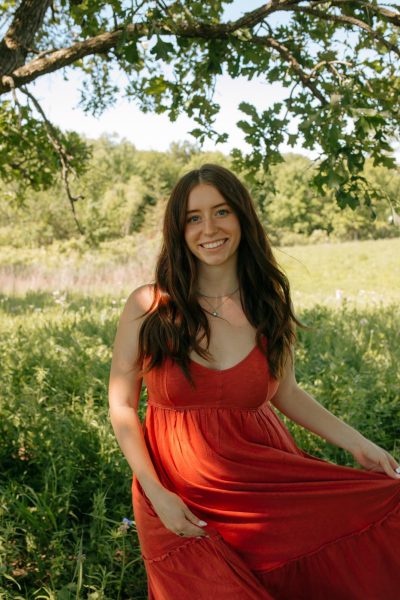
“Poor Things,” an unconventional twist on Mary Shelley’s traditional “Frankenstein” story, has polarized the opinions of its viewers. Whether it’s the film’s flamboyant costuming, radical graphic scenes, lively score, unorthodox leading lady or numerous award nominations, this movie has sparked the interest of many.
The film’s setting is unclear, but is assumed to be in the mid-19th century, set primarily in Victorian London. “Poor Things” tells the story of a young woman, Bella Baxter (Emma Stone), as she navigates the world and all its curiosities. Bella is a fully grown woman, with the brain of an infant. After her death by suicide, a mad scientist, Dr. Goodwin Baxter (Willem Dafoe), brings her back to life by replacing her brain with that of a fetus.
For the next few years of her life, she is kept inside Dr. Baxter’s home as he documents her developmental progress. This beginning portion of the movie is filmed in black and white, to represent the confined, controlled life Bella is living. Bella develops rapidly; her speech and mobility improve and her curiosity grows.
Soon, Bella’s introduced to Duncan Wedderburn (Mark Ruffalo) and he whisks her away to experience the world. Their first stop is Lisbon, Portugal, where Bella is in awe of its architecture, fashion, food, people and general way of life. It’s at this point in the film, that the movie transitions from black and white to color. The setting is vibrant and teeming with energy as Bella enters this new stage of her life.
It’s also with Duncan that she experiences her first “adult relationship.” Duncan really enjoys his relationship with Bella, mostly because he can control and manipulate her, as she’s still developing her individualism. Eventually, as their travels together continue, Bella becomes harder to dictate, both inside and outside of the bedroom.
Her next stop on the world tour is Alexandria, Egypt, where she begins her intellectual journey. In Alexandria, Bella is introduced to philosophy through literature and academic debates, but she also sees the world’s cruelty. Bella and Duncan eventually land on the streets of Paris, with no money and a rather splintered relationship. It is then that Bella turns to prostitution.
This part of the film was, at times, difficult to watch. It was beautiful to watch Bella grow into herself, but it was uncomfortable watching Duncan react to her growth. He liked Bella’s innocence and naivety because she was easy to influence. So, as she matured, he got frustrated and his attitude toward their relationship turned sour.
As Bella’s sex work continues, her relationship with Duncan ends and her individualism really shines through. Society’s view on her career path doesn’t seem to affect Bella. When she is called a whore, she simply brushes it off. She doesn’t feel as though sex has the same importance as society claims. For Bella, it’s more transactional; it pays her bills and allows her to go to school. What’s so wrong with that?
Many people are disturbed by Bella’s sexual exploration. As a woman who is technically only a few years old, seeing her work in the sex industry disturbed a lot of viewers. I have mixed feelings because it’s very difficult to gauge the autonomy Bella has over her body in this relationship. She seems to fully grasp the concept of sex, but since her brain is so young it’s hard to really know. In addition, it’s important to acknowledge existing stigmas around sex work when considering the morality of Bella’s career.
When I first saw this film, my perception of it was tainted by the graphic scenes of Bella’s relationship with Duncan and her time in the brothel. I didn’t fully grasp the complexity of Bella’s character or the point of the movie in general so it fell flat for me. Upon further consideration, I think this movie is rather extraordinary.
“Poor Things” is a representation of society’s perception of women: their sexuality, intellect and role in the world. Bella is a woman who hasn’t been conditioned by society to act or think any particular way. She is unfazed by the societal norms that have the rest of the world in a chokehold. Bella is seen as uncultured and freakish, but ironically is one of the most lovable, whimsically free characters I’ve ever encountered. This film’s eccentric, curious take on the modern woman is something that will be debated, pondered and explored for many years to come.









